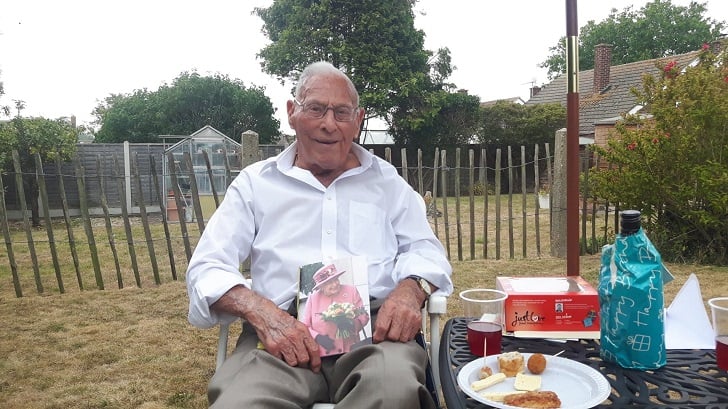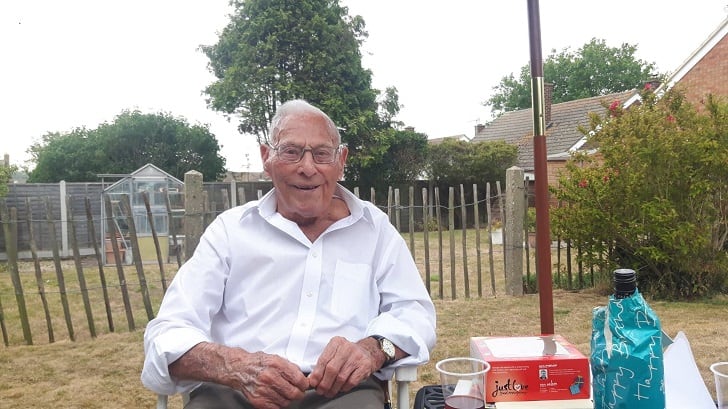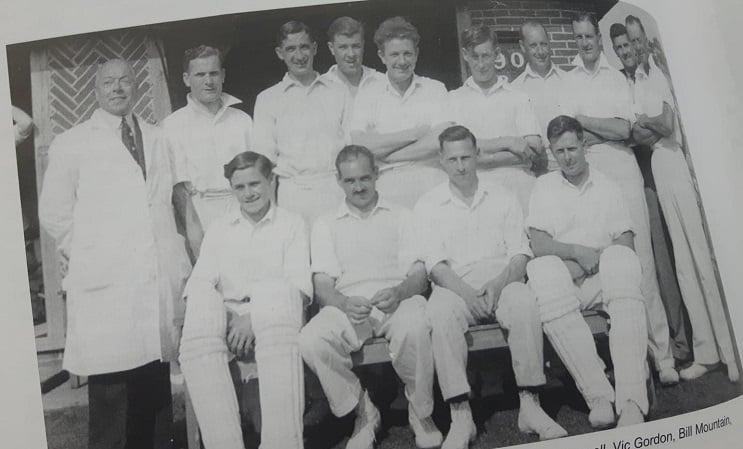
A (socially distanced) party is in full swing in Nethercourt today (August 13) as the estate’s oldest resident celebrates his 100th birthday.
Alec Tillman has been joined by family and friends at his home on the estate after having to cancel a party at his beloved Worth Cricket Club.
Born in Worth – the youngest of three boys -the former Sandwich Council School student went on to complete an apprenticeship as an electrician.
But the economic depression of the 1930s meant work was scarce.
Alec said: “I couldn’t get a job because there was no work in the 30s. So I volunteered and went into the Navy, serving for seven-and-a-half years. I’ve been around the world a couple of times and spent a lot of time in the Arctic.”
In 1941 Alec was aboard HMS Southampton in the Mediterranean which had joined the 3rd Cruiser Squadron to take part in World War Two’s Operation Excess.
In the early afternoon of January 11, both she and fellow cruiser Gloucester came under attack from 12 Stuka dive bombers from the Luftwaffe. She was hit by at least two bombs south-east of Malta and caught fire. The resulting blaze spread from stem to stern and trapped a number of men below decks.

Eighty-one men were killed with the survivors being picked up by Gloucester and the destroyer Diamond.
Leading Seaman Electrical Alec was one of those picked up by the destroyer. Alec, who was also involved in the Siege of Tobruk spent a further two years serving in the Med.
Alec said: “After the war I went back to electrical work as a foreman electrician for the Ramsgate Corporation and Thanet council. I retired in 1981.”
Outside of work Alec was a talented cricketer with Worth Cricket Club, which formed in 1921.
He said: “I played cricket for Worth from the age of 13, in 1933, until I was 60 in 1980.”

Alec married wife Ivy in 1942. The pair met in Worth but were married in Doncaster, where Ivy’s family roots were.
Alec said: “In those days Betteshanger Colliery was just opening as a coal mine. Ivy’s family were all coal miners in Yorkshire. There was no work there so they came down here for work. When the war came along they went back to Yorkshire and that’s why we got married in Doncaster.”
Super-fit Alec and his brother-in-law also found a novel way to travel for a week’s holiday – cycling a tandem for 240 miles from Worth to Doncaster!
Alec said: “We had a week’s holiday and then rode back home again! It took us 24 hours.”
The dad-of-one, grandad-of-two and great-grandad-of-three lives at home, bakes his own bread and cheese straws and travels to Sandwich every Thursday (pre-Covid) for the Sandwich United Reformed Church coffee morning followed by lunch at Age Concern.
He said: “I also visit my friends who played cricket like me but we are all getting to ancient for that now!”
In the year Alec was born (1920):
George V was on the throne
David Lloyd George was the coalition Prime Minister
Prince Albert (later George VI), having become Duke of York earlier in the year, meets Elizabeth Bowes-Lyon, who will become his wife in 1923 (and later Queen Elizabeth The Queen Mother).
January–November – experimental radio broadcasts including speech and music are made from a studio at the Marconi Company factory in Chelmsford, Essex
11 February – the Council of the League of Nations meets for the first time in London.
23 February – War Secretary Winston Churchill announces that conscripts will be replaced by a volunteer army of 220,000 men.
10 March – the Ulster Unionist Council accepts the Government’s plan for a Parliament of Northern Ireland.
17 March – Queen Alexandra unveils a monument to Nurse Edith Cavell in London.
27 March – Troytown wins the Grand National.
20 April–12 September – Great Britain and Ireland compete at the Olympics in Antwerp and win 15 gold, 15 silver and 13 bronze medals.
9 June – King George V opens the Imperial War Museum at The Crystal Palace.
3 July – the Scenic Railway (roller coaster) at Dreamland Margate opens, the first in the U.K.
16 July – World War I is officially declared over with Austria.
23 July – fourteen die and one hundred are injured in fierce rioting in Belfast.
22 September – the Metropolitan Police forms the Flying Squad, following an announcement on 17 February that their horses will be replaced by cars.
7 October – the first one hundred women are admitted to study for full degrees at the University of Oxford.
10 October – it is announced that compulsory hand signals are to be introduced for all drivers.
16 October – miners go on strike.
20 October – suffragette Sylvia Pankhurst is charged with sedition after calling upon workers to loot the London Docks.
8 November – Rupert Bear first appears in a cartoon strip in the Daily Express.
10 November – the body of The Unknown Warrior arrives from France aboard HMS Verdun for burial in Westminster Abbey.
11 November – King George V unveils the Cenotaph; The Unknown Warrior is buried.
21 November – Bloody Sunday: the Irish Republican Army, shoot dead fourteen British undercover agents in Dublin, most in their homes. Later this day in retaliation the Auxiliary Division of the Royal Irish Constabulary open fire on a crowd at a Gaelic Athletic Association Football match, killing thirteen spectators and one player and wounding 60
29 November – rationing imposed during World War I ends when the restriction on availability of sugar is lifted by the government.
23 December – Government of Ireland Act 1920, passed by the Parliament of the United Kingdom, receives Royal Assent providing for the partition of Ireland into Northern Ireland and Southern Ireland with separate parliaments

